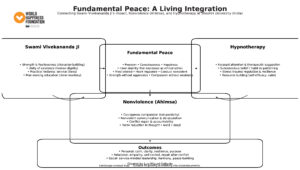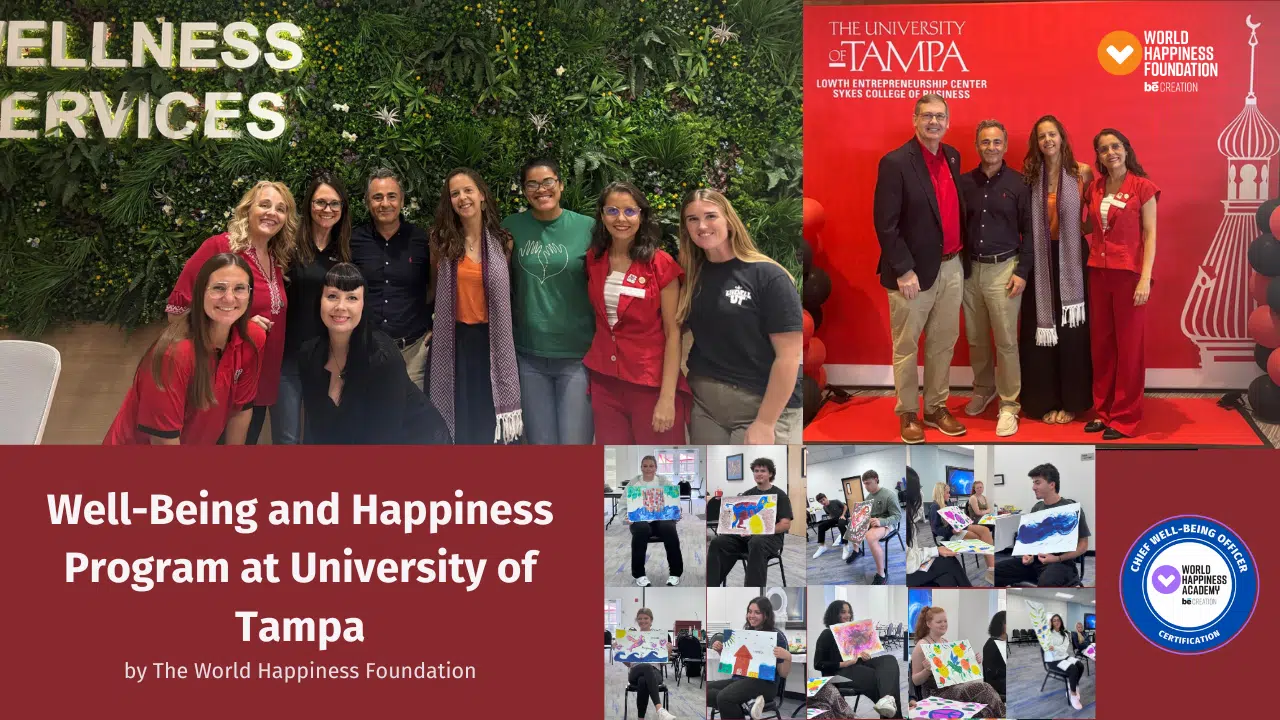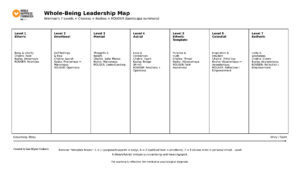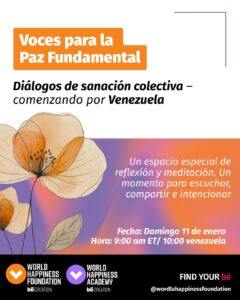
Swami Vivekananda Ji: A Living Impact on Strength, Service, and Inner Peace.
Swami Vivekananda Ji: A Living Impact on Strength, Service, and

In recent years, universities have grappled with a student mental health crisis of unprecedented scale. National surveys indicate that approximately 76% of college students report moderate to severe psychological distress, with anxiety and depression the most common challenges. Feelings of loneliness and isolation afflict more than half of students, reflecting an urgent need for campus programs that build community and emotional resilience. In response to these challenges, The University of Tampa (UTampa) has launched a pioneering initiative in partnership with the World Happiness Foundation – the Ignite the Fire Well-Being and Happiness Program – aimed at proactively addressing student mental health and socio-emotional needs. This academic-year program, spearheaded by UTampa faculty member Dr. Ellen Campos-Sousa with strong support from Provost Dr. Michael T. “Mike” Stephenson and Wellness Center Assistant VP Gina M. Firth, takes an innovative whole-person development approach. By focusing on purpose crafting, mindfulness, self-regulation, vision boarding, team building, socio-emotional skills, resilience, shadow work, and personal responsibility, the program endeavors to help students flourish and lead fulfilling lives as whole persons. In this article, we explore how Ignite the Fire was conceived, its core components, and why it represents a forward-thinking model for student well-being in higher education.
The impetus for Ignite the Fire comes against a backdrop of rising student mental health concerns at UTampa and nationwide. University administrators have recognized that emotional well-being is inseparable from academic success – a fact underscored by a UTampa survey where 84.9% of students reported that emotional health affects their academic performance. In analyzing student withdrawal data, UTampa leaders found stress and mental health issues were increasingly cited as reasons for students leaving the university. “We want to equip students with the right resources at the right time,” noted one UTampa official, emphasizing a shift toward preventative measures rather than waiting until problems reach a crisis. This philosophy is embodied in the broader UTampa Cares initiative – the university’s Quality Enhancement Plan focusing on emotional well-being, belonging, and resilience as pillars of student retention. Ignite the Fire builds on this foundation, taking UTampa’s wellness commitment a step further by integrating global expertise from the World Happiness Foundation into campus programming.
Dr. Ellen Campos-Sousa, the architect of Ignite the Fire together with Luis Miguel Gallardo and Paulina Nava Villazón, brings a unique background to the effort. An assistant professor at UTampa, she also serves on the board of the World Happiness Foundation, where she spearheads research on promoting happiness and well-being in schools and organizations. In this role she advances the Foundation’s mission of “fostering global happiness, creating more conscious, happy, and thriving communities”. With her guidance, UTampa forged a partnership with the foundation’s experts to design a curriculum that targets both individual growth and community connection. The result is a pilot program (the first of its kind at UTampa and one of the first in Florida) that is officially sponsored by the University’s administration. Provost Mike Stephenson – a scholar of health communication – and Gina Firth – head of UTampa’s Wellness Center – have championed the program as part of a strategic effort to infuse well-being into campus life. Such high-level support signals that UTampa’s leadership views student wellness not as ancillary, but as central to the academic mission. “This is a super important project, and I’m absolutely thrilled we’re engaging in this,” Firth said of a related wellness initiative, a sentiment equally applicable to Ignite the Fire’s launch. By collaborating with the World Happiness Foundation, UTampa is tapping into a global movement that treats happiness and well-being as critical outcomes for educational institutions – aligning with the Foundation’s vision of “10 billion happy by 2050” through cultivating enlightened leaders and communities worldwide.
At the heart of Ignite the Fire is an emphasis on meaning and mindset – helping students define their purpose, practice mindfulness, and envision positive futures. Research has shown that developing a sense of purpose yields wide-ranging benefits for mental health and resilience. People who identify a clear purpose in life tend to experience lower stress, better sleep, stronger immunity, and even longer life spans. This is partly because living with purpose can reduce chronic cortisol (the stress hormone) levels, making individuals less reactive and more resilient in the face of challenges. In light of these findings, Ignite the Fire begins with “purpose crafting” workshops. Students engage in reflective exercises to explore their core values, passions, and long-term aspirations. They might journal about what gives them meaning, discuss personal values in small groups, or set life goals beyond college. By articulating a “why” for their education and life, students build an internal compass that can guide them through stress and setbacks. As one might expect, “identifying what gives your life purpose requires thought and reflection” – a process that can involve clarifying values, aligning daily actions with those values, and trying new activities that resonate. Ignite the Fire coaches students through this journey of self-discovery, with the premise that a student driven by purpose will be more motivated, resilient, and hopeful during the ups and downs of college life.
Complementing purpose crafting is training in mindfulness – the practice of present-moment awareness and nonjudgmental acceptance. Mindfulness meditation has been widely studied as a tool to combat stress and foster emotional well-being among university students. In fact, a 2023 systematic review and meta-analysis concluded that “mindfulness is effective for improving the mental health of college students”, with interventions significantly reducing students’ stress, anxiety, and depressive symptoms. Some universities have even found that 8-week mindfulness courses can prevent mental illness and improve student well-being, with measured improvements in students’ resilience, self-awareness, and concentration following mindfulness programs. Armed with such evidence, Ignite the Fire incorporates mindfulness throughout its curriculum. Students are introduced to techniques like breathing exercises, guided meditation, and body scans to help them self-regulate their emotions and attention. Short mindfulness sessions (for example, a 5-minute guided meditation at the start of each workshop) help students center themselves and reduce anxiety. Over time, these practices build students’ capacity for emotional self-regulation – enabling them to respond to academic and personal stresses more calmly rather than with panic or overwhelm. As students learn to observe their thoughts and feelings without immediate reaction, they gain a powerful tool to manage test anxiety, interpersonal conflicts, and other common stressors of college life. The mindfulness training in Ignite the Fire is meant to be highly accessible; students of all backgrounds (even those new to meditation) can participate in simple mindful breathing or grounding exercises. By integrating mindfulness into an educational setting, UTampa is following a growing trend in higher education that views mindfulness not only as a wellness practice but also as a way to improve focus and learning. Studies in the UK and elsewhere have noted that even brief mindfulness interventions for students can boost well-being and may prevent more serious mental health issues from developing. For Ignite the Fire, the takeaway is clear: mindfulness is a teachable skill that underpins emotional balance and academic resilience.
Another distinctive element of this program is the use of vision boarding as a creative, future-oriented exercise. A vision board is typically a collage of images, words, and symbols that represent a person’s goals or ideals – essentially a visual life roadmap. In counseling and positive psychology, vision boards have evolved from a pop-culture trend into a recognized therapeutic and motivational tool. The act of crafting a vision board engages students in identifying what they want to achieve or cultivate in their lives (such as a successful career, healthy relationships, personal growth milestones) and then translating those goals into pictures and quotes for daily inspiration. Therapists have observed that creating a vision board can itself be a form of mindfulness, as it requires individuals to focus intently on their aspirations and the present creative process. This immersive focus tends to quiet external anxieties, thereby “reducing stress and promoting a sense of calm and well-being”. In Ignite the Fire workshops, students gather magazines, art supplies, and digital images to build their personal vision boards. As they do so, program facilitators guide discussions about aligning one’s daily habits with long-term visions and how to stay motivated when facing obstacles. The finished boards become tangible reminders of each student’s “big picture,” which they can hang in their dorm or keep on their phone for motivation. Beyond motivation, vision boards also help nurture optimism and agency – students literally picture their desired future, which can strengthen their belief in achieving it. The process can illuminate their values and interests (for instance, a board filled with travel images might reveal a passion for exploration, suggesting a student seek global learning opportunities). As Donnette Deigh, a counseling scholar, noted, vision boards guide people through life’s transitions and uncertainties by providing “a visual testament of [one’s] progress over time” and tangible proof of growth and hopes achieved. In sum, purpose crafting, mindfulness, and vision boarding form a trio of practices in Ignite the Fire that sharpen students’ sense of self and direction. These activities cultivate inner resources — meaning, calm, and optimism — that fortify mental health from within.
Ignite the Fire also explicitly targets the development of social and emotional competencies that are crucial for thriving in a campus community. Modern research in education emphasizes that universities must encourage not only academic skills but also socio-emotional skills to support student well-being and success. This program embraces that philosophy by offering interactive workshops and team-building exercises to hone students’ emotional intelligence, communication, and group bonding. One component is a series of socio-emotional skills sessions where students learn and practice skills like emotional awareness, empathy, active listening, conflict resolution, and stress management techniques. These sessions often take the form of role-playing scenarios or group discussions. For example, students might role-play common college situations – a roommate conflict, a time management crisis, receiving critical feedback – and then discuss emotionally intelligent ways to handle them. The goal is to improve students’ self-awareness (recognizing their own emotional triggers and patterns) and social awareness (reading others’ emotions, showing empathy). By doing so, students become better equipped to form healthy relationships and support each other, rather than struggling in isolation.
Team building is another key facet – not just as a one-off icebreaker, but as an ongoing practice to strengthen peer support networks. Research consistently shows that a sense of belonging is protective for student mental health; in fact, feeling connected to campus can buffer stress and reduce the likelihood of dropping out. Conversely, feelings of isolation are a top reason students leave college. Ignite the Fire addresses this by weaving team-based activities throughout the program. In small groups (often dubbed “fire teams” for this initiative), students collaborate on fun and meaningful projects – from problem-solving games and trust-building exercises to group volunteer projects that give back to the community. One week, a team might tackle a challenge course on campus that requires communication and cooperation; another week, they might collectively design a small service project or campus event promoting kindness. These experiences help students build friendships, learn to rely on and support one another, and foster a community of care. The emphasis on teamwork also implicitly teaches responsibility and accountability – students see firsthand how their contributions (or lack thereof) impact the group, mirroring the interdependence of real-world communities and workplaces.
Furthermore, Ignite the Fire’s group approach creates a safe space for students to discuss personal challenges and coping strategies, thereby normalizing help-seeking and vulnerability among peers. Peer support is a powerful factor in mental health: sharing experiences with a supportive group can reduce stigma and encourage students to utilize campus resources when needed. UTampa’s broader wellness strategy has recognized this, establishing Peer Wellness Coaching and student support groups as part of UTampa Cares. Ignite the Fire complements those efforts by ensuring each participant feels seen and supported by a tight-knit team within the larger university. In doing so, the program builds what UTampa calls a “community of care,” where students, faculty, and staff look out for one another’s well-being. By the program’s end, students not only gain individual skills but also become part of a peer network that can endure throughout their college years – a critical asset given the known link between social connection and positive mental health outcomes.
The ultimate aim of Ignite the Fire is to equip students with resilience – the capacity to bounce back from adversity – and a sense of personal responsibility for their growth and happiness. College is a formative period often filled with setbacks (academic struggles, failed plans, personal disappointments). Rather than shield students from these realities, the program prepares them to face challenges head-on and learn from them. Through resilience-building workshops, participants learn strategies for coping with failure, managing academic pressure, and maintaining a growth mindset. They practice techniques such as cognitive reframing (finding positive or instructive aspects of a setback), stress reduction methods (e.g. brief mindfulness breaks or physical exercise routines during exams), and help-seeking skills (knowing when and how to reach out to mentors, counselors, or friends). Importantly, these workshops reinforce that experiencing stress or failure is not a personal flaw but a normal part of growth – and there are tools to handle it. This message aligns with broader public health recommendations calling for “strategies to inoculate students against stress” during the intense college years. By learning resilience skills in a proactive way, students may be less likely to reach a point of crisis. In fact, experts argue that fostering coping skills and resilience in students is just as essential as identifying those at risk. Ignite the Fire embraces this preventative approach: it is far easier to build resilience early than to remediate a breakdown later.
Another defining feature is encouraging personal responsibility and agency in one’s well-being journey. The program mentors do not position students as passive recipients of help, but rather as active drivers of their own development. For example, each student in Ignite the Fire creates a personalized “Well-Being Action Plan” at the start of the semester – setting specific, achievable goals related to the program’s themes (such as “practice mindfulness 10 minutes each morning,” “join one new club to build social connections,” or “attend a weekly yoga class for stress relief”). They are then accountable for tracking their progress on these goals, with check-ins and support from coaches. This instills a habit of self-regulation and accountability. Students learn that while the university provides many resources, ultimately they must make daily choices that impact their mental and emotional health. By treating students as partners in the process, Ignite the Fire cultivates a sense of ownership: participants often report feeling more confident and in control of their well-being after completing the program. This focus on responsibility dovetails with building character and integrity – qualities that will serve students beyond college. As they plan events, lead team activities, or simply follow through on personal commitments, students practice being dependable and proactive. In essence, they are exercising their “responsibility muscle,” which will help them handle the freedoms and stresses of adult life after graduation.
Finally, the comprehensive nature of Ignite the Fire reflects a holistic or whole-person development philosophy. Rather than addressing academic skills, physical health, or emotional wellness in isolation, the program attends to the interplay of all these dimensions. This mirrors the trend in both education and corporate training that highlights whole-person development as key to success – balancing “human skills” like adaptability, empathy, and communication with traditional technical skills. By nurturing qualities like self-awareness, empathy, collaboration, and purpose, UTampa’s program is effectively enhancing students’ “human skills” alongside their academic learning. The benefit of such holistic learning is a more mentally flexible and resilient individual: connecting various aspects of personal growth can “naturally strengthen mental flexibility and resilience”. For instance, a student who learns mindful breathing (a mental technique) may apply it when facing a social conflict, thus handling it with more calm and understanding – blending internal regulation with interpersonal skill. Whole-person education recognizes that a student who thrives emotionally and socially will also perform better academically and professionally. This idea is supported by evidence that wellness programs and mental health education can empower students with lifelong tools for resilience and healthy coping. The Ignite the Fire program embodies that approach: by teaching students how to maintain well-being through various means, it is likely to yield not only happier students but also more academically persistent and engaged ones. Indeed, UTampa will be measuring the program’s success in terms of retention rates, student self-reported belonging, and resilience growth over time – indicators that tie well-being to educational outcomes.
Ignite the Fire is more than a student wellness program – it represents a paradigm shift in how universities can support the whole student. By integrating evidence-based practices from positive psychology and social-emotional learning into the fabric of campus life, the University of Tampa is proactively addressing the root causes of student distress. Early results and feedback from participants have been encouraging: students report feeling more connected, more purposeful, and better equipped to handle stress after engaging with the program. Administrators, too, are optimistic that such initiatives will improve student retention and success by creating a flourishing campus culture. As Provost Mike Stephenson has emphasized, supporting student well-being is integral to “elevating academic excellence” and preparing graduates who are not only knowledgeable, but resilient and emotionally intelligent members of society.
For other universities and wellness professionals, Ignite the Fire offers a compelling case study of a comprehensive approach to student mental health. Key takeaways include the importance of administrative buy-in, the value of partnerships (leveraging external expertise like the World Happiness Foundation), and the efficacy of combining multiple modalities – from mindfulness to mentorship – under one umbrella. The program illustrates that investing in preventative, skills-based wellness education can pay dividends in student engagement and well-being. It also aligns with a broader movement in higher education towards creating environments where students can thrive, not just survive. As one mental health advocate noted, there is “an urgent need for strategies to inoculate students against stress… especially among young adults”, and the best strategies are those that empower students with knowledge, skills, and support networks before crises emerge.
Ultimately, Ignite the Fire’s holistic focus on purpose, mindfulness, socio-emotional skills, and resilience is helping students light their inner spark and sustain that fire through the challenges of college life. By educating the whole person – mind, heart, and spirit – the University of Tampa is developing not only happier students, but also well-rounded future leaders who can contribute positively to their communities. In a time when student mental health can feel like an uphill battle, UTampa’s approach provides a beacon of hope and a model worth emulating: a university where well-being is woven into the curriculum, and where every student is empowered to ignite their own fire for a fulfilling life.
Sources:
#IgniteTheFire #WorldHappinessFoundation #UniversityOfTampa #UTampa #StudentWellbeing #MentalHealthMatters #SocioEmotionalLearning #Mindfulness #PurposeCrafting #VisionBoarding #SelfRegulation #Resilience #WholePersonDevelopment #TeamBuilding #Flourishing #PositiveEducation #CampusWellness #PeerSupport #SenseOfBelonging #TraumaInformed #CompassionateCampuses #HigherEd #WellnessProfessionals #HappinessEducation #PreventiveWellness #StudentSuccess #UTampaCares #DrEllenCamposSousa #DrMikeStephenson #GinaFirth #Happytalism

Swami Vivekananda Ji: A Living Impact on Strength, Service, and

Introduction In today’s transformational leadership coaching, ancient spiritual models are

We are living through a time when pain is increasingly